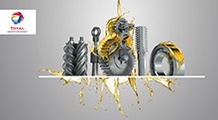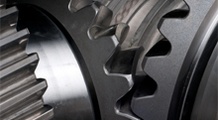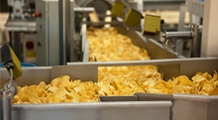Industrial vs. Automotive Lubricants
As we have seen, lubricants are used to reduce the friction that occurs between surfaces in moving parts. One of the biggest misconceptions that are made is that lubricants are the same because they perform a similar function, but not all lubricants are the same. And just as you wouldn’t mix up, say, engine oil with coolant, you don’t want to mix up your automotive lubricants with your industrial lubricants.

Why?
When deciding on what the proper lubricant is for a specific application, you may already know that the relevant viscosity is the most important attribute to achieve sufficient lubrication. But there are numerous oils that have a similar grade or viscosity—for example, while an SAE 90 gear oil sounds like it’d be thicker than SAE 50 engine oil, they are actually the same viscosity but it doesn’t tell the full story.
These two gear oils may have the same viscosity, but you can’t substitute between them because of this fact. Even though two lubricants might be perceived as being made for similar purposes (in terms of viscosity or function), it’s their structure which makes them different and more effective for certain functions. In the case of the gear oil used in our example, the additive pack is different.
The additive structure of each type of lubricant makes-up the major differences between industrial and automotive types. While both engine oils and gear oils contain “anti-wear additives,” and are required to lubricate, cool, and protect, they do so in extremely different environments.
Industrial gear lubricants are exposed to the stresses of industry on a daily basis: high-pressure, high-heat environments with regular contact with contaminants, such as dirt and water. In fact, high pressure requires a specific lubricant that will provide a suitable level of film thickness between the interacting gear surfaces while operating. Gear oils need to be able to tolerate these conditions while providing efficient lubrication for smooth-running machines.
Types of Industrial Gear Lubricants
The additives that are contained in the industrial gear oil define the lubricant’s general category and affect its qualities and performance. Industrial gear lubricants are usually broken down into the following categories: Extreme Pressure (EP) Gear Lubricants, Synthetic Gear Lubricants, Synthetic EP Gear lubricants, Synthetic Polyglycol Gear Lubricants, Compound gear Lubricants, and Food Grade Gear Lubricants.

Extreme Pressure Gear Lubricants
Extreme pressure gear lubricants comprise of additives that are required in some heavily loaded gearboxes; these additives protect gear teeth from micro pitting (localised corrosion), which can lead to systems failure. Extreme pressure lubricants should never be used in applications that don’t especially require the use of Extreme Pressure additives.
Synthetic Gear Lubricants
Synthetic gear oils without extreme pressure additives deliver protection from wear and sludge formation in situations where extreme pressure additives are not recommended (examples of this being when corrosion of yellow metal is an issue).
Synthetic Polyglycol Gear Lubricants
Polyglycol gear lubricants are non-petroleum fluids and can potentially offer the same or better protection in a number of industrial applications. This can vary from enclosed gears to bearings and compressors. Polyglycol-based gear lubricants pose no threat to bronze, copper, or brass components, but they are not suggested for use with gears made of an aluminium-bronze alloy.
Compound Gear Lubricants
Compound gear lubricants are typically used with industrial worm gears ( a composition where a screw meshes with a gear) that require a higher viscosity lubricant. Compounded gear lubricants are designed with 4-6% tallow or synthetic fatty acid for increased lubrication.
Food Grade (H-1) Gear Lubricants
Food-grade gear lubricants are specifically designed for use in gear drives that operate in food and beverage processing plants and are used when there is a potential for incidental food contact occurring.

Finol: Industrial lubricant suppliers
As each Industry have their own specific requirements, Finol provide Total lubricants that are perfectly adapted to the environment in which you operate. Our extensive range of industrial lubricants includes the Carter gear oil range, Equivis and Azolla hydraulic oils, Dacnis compressor oils, Seriola heat transfer oils, Drosera Slideway Oils and a vast Grease range to name just a few of our products. We also provide a wide range of high-quality turbine and rust preventative oils suitable for all your needs. To view the full range of Industrial lubricants available at Finol click here. If you would like to speak to one of our highly qualified team members about your needs click here.
